¿El cable del altavoz afecta la calidad del sonido? Sin mitos, solo hechos
Los accesorios de audio, como los cables y los cables de los altavoces, son algunas de las cosas más caras y publicitadas que puedes comprar.
¿Debería gastar mucho dinero en un cable de altavoz o cable de audio "mágico"? ¿Hace alguna diferencia en la calidad de sonido del sistema de audio de su hogar o automóvil?
Te diré esto y más en términos claros y simples. ¡Sigue leyendo!
Respuestas rápidas:¿El cable del altavoz afecta la calidad del sonido?
Datos rápidos sobre el cable del altavoz y la calidad del sonido- En circunstancias normales, la respuesta es NO:el cable del altavoz no afecta la calidad del sonido. Sin embargo, en algunos casos (explicados más adelante) la calidad del sonido o el volumen pueden verse afectados un poco.
- No hay datos de pruebas científicas que respalden la idea (engañosa) de que los cables de altavoz "especiales" o "para audiófilos" o los cables caros marcan una diferencia notable frente a los cables de altavoz asequibles y de buena calidad del calibre correcto. ¡El 99,9 % de las veces son afirmaciones sin fundamento y la diferencia realmente no importa!
- El uso de alambres o cables no estándar en lugar de alambres para altavoces puede provocar cambios en el sonido, aunque muy pequeños. Un cable excesivamente largo o de alta resistencia puede afectar el sonido al causar una caída en el volumen del altavoz y algunos otros detalles.
- Para obtener los mejores resultados, no enrolle cables de altavoz de gran longitud, ya que esto puede crear una inductancia que reduce algunas frecuencias de sonido como lo hace un cruce.
- El cable entre los cruces de parlantes y los parlantes debe ser bastante corto. Un cable excesivamente largo al cruce y a los parlantes puede causar que el comportamiento del cruce cambie y altere la respuesta de sonido del parlante.
Alambres y cables para audiófilos y exagerados
Uno de los mayores problemas que he visto a lo largo de los años es la cantidad de publicidad y exageración utilizada para vender cables de todo tipo a precios excesivos:cables de altavoces, cables de audio (como cables RCA), cables de video e incluso cables de datos y computadoras.
No se limita al uso de video o altavoces domésticos, también ha habido mucho en el mundo del estéreo del automóvil.
Los cables y alambres de audio sofisticados se basan en tonterías
A menudo, las empresas y los audiófilos afirman que sus cables de alto precio ofrecen un mejor sonido debido a algún tipo de ventaja técnica esotérica y elegante. El problema es que no hay datos de pruebas científicas que lo respalden. La mayoría de las veces es solo marketing para obtener mayores ganancias.
De hecho, cuando se trata de productos electrónicos, los accesorios de audio como el cable de conexión RCA, los cables para auriculares y los cables para altavoces son una de las categorías más rentables para los minoristas.
La ciencia del cable de los altavoces y la calidad del sonido
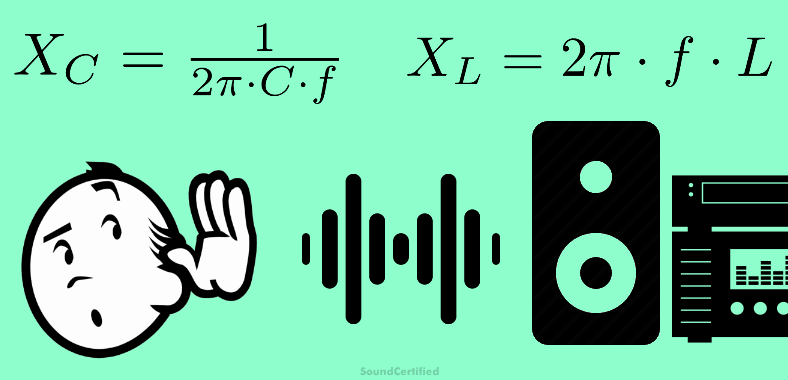
Aquí hay una lista de razones por las que no notará ninguna diferencia en la calidad del sonido debido al cable del altavoz. Hay algunas excepciones que no son típicas y que explicaré más adelante.
Datos sobre la calidad del sonido del cable del altavoz:
- Si bien es cierto que muchos componentes y conductores eléctricos tienen capacitancia e inductancia que pueden afectar el sonido, el cable del altavoz tiene muy poca. Mucho menos de lo que se necesita para tener un impacto real en la calidad del sonido y la respuesta de frecuencia de un sistema de altavoces.
- Cosas como el rendimiento de los altavoces, la inductancia de la bobina de voz, los cruces de altavoces y más tienen un impacto mucho más significativo en la calidad del sonido – cientos de veces más grande, de hecho.
- Los cables de los altavoces están formados por un haz de conductores delgados que se tocan entre sí, lo que mantiene la capacitancia y la inductancia en un nivel tan pequeño que es insignificante para el audio. Otros tipos de cable (como los conductores aislados individualmente) pueden tener un impacto en el sonido, pero no son cables para altavoces.
- El fenómeno del conductor eléctrico conocido como efecto piel no se aplica al rango de frecuencia de audio. No es una preocupación hasta que se trata de frecuencias mucho más altas (megahercios y rangos más altos). Las frecuencias de audio abarcan un rango de 20 Hz a 20 kHz.
- Si bien es cierto que se han realizado pruebas de escucha a ciegas para intentar "probar" que los cables o cables de audio especiales suenan mejor para las personas, nunca se puede probar. De hecho, las pruebas casi siempre tienen fallas graves y no tienen datos de pruebas de audio científicas sólidas que las respalden. Para empeorar las cosas, el efecto placebo tiene un impacto en la prueba y las personas tienen diferentes niveles de audición.
- El calibre que necesita depende de la potencia suministrada por su amplificador o estéreo y la duración.
- El cable de altavoz más grueso tiene menor resistencia, capacitancia e inductancia en comparación con el cable delgado, ya que tienen un área de sección transversal más grande (más conductancia/menos resistencia).
Speaker wire electrical resistance, capacitance, and inductance explained
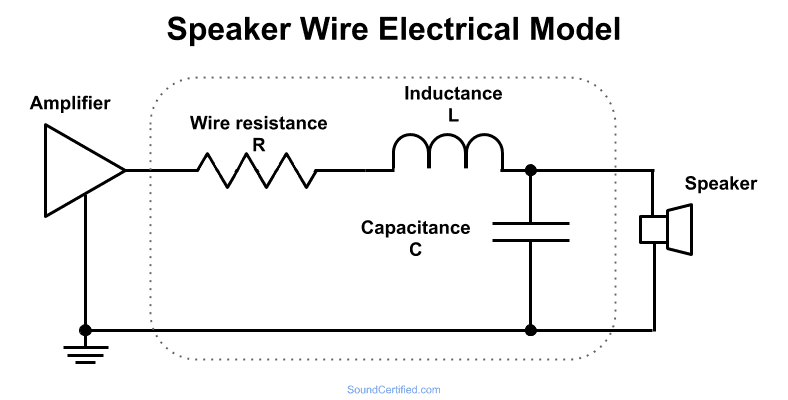
A diagram showing a model of how you can think of speaker wire or other conductors. The wire has a very small amount of resistance, inductance, and capacitance in it.
You can think of speaker wire, like other electrical wire, as being made up of a resistor, an inductor, and a capacitor, as nearly all conductors have at least a tiny bit of each. Resistors oppose the flow of electrical current and cause some voltage to be lost.
Capacitors and inductors are sort of like resistors but their “resistance” (called impedance in this case) changes with frequency. Because of it, they’re bad to have in wires that carry an alternating current (AC) electrical signal like music, but extremely useful in things like speaker crossovers.
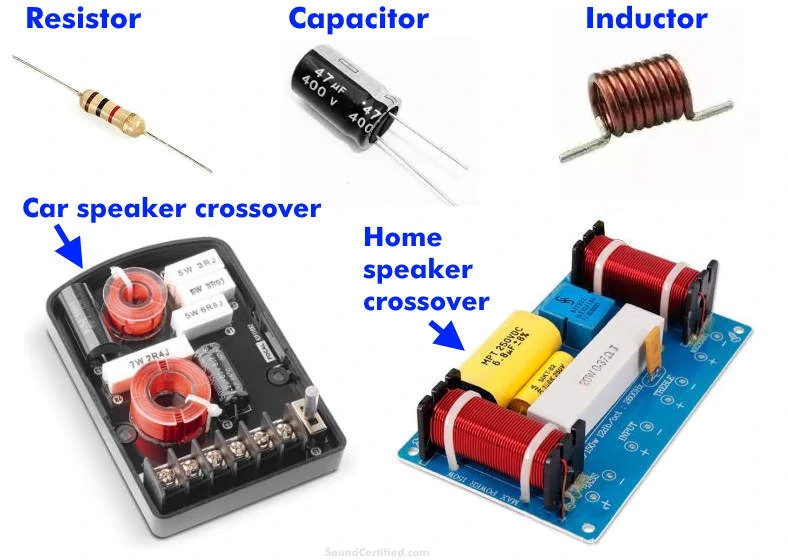
You might be thinking, “If speaker wire has some inductance and capacitance, wouldn’t that hurt the sound? ”
The answer, in this case, is no.
That’s because unlike speaker crossovers where we use large values of capacitors and inductors to filter out or block certain sound ranges to speakers, speaker wire has an incredibly tiny amount. Certainly not enough to have any real effect in most cases.
For example, we could use a capacitor in line with a tweeter to block distorting &damaging bass from reaching it. That’s possible because the impedance (or resistance to current flow) decreases with the frequency, meaning that lower frequencies get reduced a lot and effectively filtered out.
Even basic speaker wire is good!
In the case of speaker wire, if the capacitance were a high value it would be possible for higher frequencies that reach the speaker to be greatly reduced &cause a poor sound quality.
Likewise, if the inductance were high enough to matter it could affect sound quality too. As I mentioned before, however, speaker wire has very low values of each. Ordinary lamp power wire (extremely similar to 18AWG or 16AWG wire) has only about 10-20pFarad capacitance per foot, give less than 1% loss in the audible range for a 50 foot length.
(For comparison, a picoFarad is .000 000 000 001, or a billionth of a Farad unit of capacitance. Capacitors used in audio speaker systems are around a few hundredths of a Farad.)
What is in speaker wire?
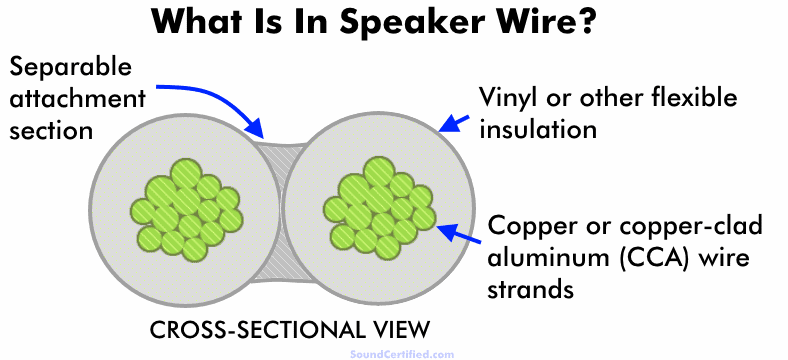
Speaker wire is made up of fine strands of wire, usually copper or copper-clad aluminum (CCA), that are bundled together and electrically separated from each other inside flexible insulation. Other kinds exist too, like those that are also bundled with a thin shield or other special features.
The insulation usually has a thin section in the middle which can be torn easily for separating the wires when stripping it, connecting it, and so on. Most of the time one wire is marked with a positive indicator of some kind.
Speaker wire vs electrical wire
Both electrical hookup wiring (similar to lamp cord) and those sold for speakers often use small strands of conductors and flexible insulation. In fact, in many cases, you can use either. However, you can find audio wire that’s even more flexible and has its polarity marked with red or black as well as printing. Some also have even finer copper conductors to make installation easier around tight spaces or curved areas such as cars and trucks.
Does splicing affect sound quality?
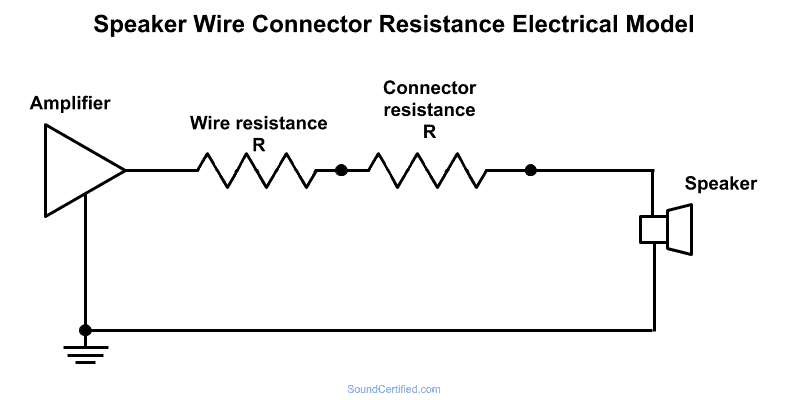
This diagram, like the speaker wire electrical model, shows how you can think of a speaker wire connector. Both wire conductors and connections do have some resistance, although a tiny amount that’s negligible when used correctly. Sound quality isn’t a problem unless there’s an unusually bad connection.
Adding a connector to speaker wiring by splicing, either by soldering, crimp connectors, or other ways doesn’t normally affect sound quality . It can’t – it’s just another path for the flow of power &and the audio signal to flow through.
However, it is possible for an unusually poor connection to have a bad enough resistance that the speaker could have noticeably less volume &power loss. That’s because when a very bad connection causes a high amount of resistance to the flow of current, it also causes a large voltage drop across it, too.
That means less power is available to the speaker than normally would be at the same volume setting. It’s a waste of power.
To avoid this:
- Always use a high-quality connection for speaker wire splices like when extending existing wire. Soldering is the best of all, but good quality crimp connectors are excellent too.
- Wire connection strips (wire terminal barrier strips) with clean nickel or other plated metal contacts are suitable as well for speaker systems.
- Gold plating is not important and you won’t hear the difference.
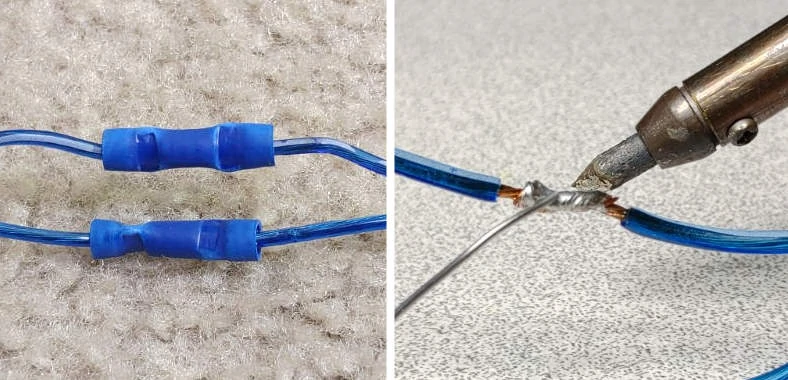
Good quality crimp connectors (left) and soldering (right) are great choices for speaker wire.
The most important thing is to make a tight &clean connection with great wire-to-wire contact.
In some cases like marine &boat use, connectors can corrode &galvanize, causing other issues that do limit sound quality. That’s much less common, however. (In that case, using an anti-corrosion liquid or spray can keep the wire from getting to that point)
TIP: When stripping insulation to expose bare wire you can prevent oxidation over time by “tinning” it (tinning speaker wire means using a soldering iron to flow solder through the exposed conductors and coat them.)
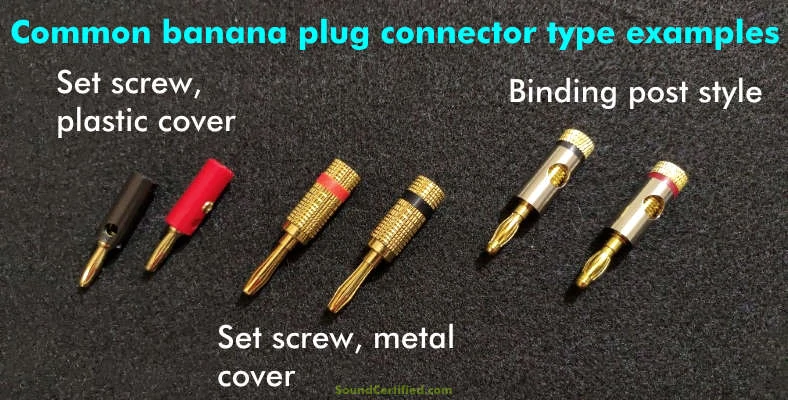
A good option that’s both affordable, simple to use, and makes a great connection is a banana plug pair if your stereo system can use them.
Does the length of speaker wire affect the sound?
It’s definitely possible to lose sound quality a little bit by using a wire or cable length that’s excessively long or not large enough.
That’s because:
- A much greater speaker wire length (say 50+ feet [15.2m], especially 100ft [30m] or more) has more resistance and can cause a small volume &power drop, especially at maximum amplifier power levels. It can also affect a parameter called the damping factor, although it’s not normally an issue.
- Very long lengths of wire will have more capacitance that can slightly affect the frequency response at the speaker. It depends on the particular wire.
- It depends on the power because more power means higher amps pass through the conductors. A lower speaker impedance like 4 ohms or 2 ohms will draw more current than a higher impedance like 8 ohms for the same power.
Unfortunately, even if you’re technically inclined, almost no speaker wire makers offer any technical specs to help you figure out what you can expect for very long lengths. We can, however, use the American Wire Gauge (AWG) standard to know the resistance per foot for most stranded wire.
How long can you run speaker wire without impacting quality?
The length depends on a few things &the AWG size (wire gauge) you’re using. There are a few things that make a big difference:
- The speaker’s impedance. This is usually 6-8 Ohms for home stereo speakers and 4 or sometimes 2 for car audio.
- Amplifier power level you’ll use.
Here’s a basic wire size &length chart to help.
Simplified speaker wire size &length table
| Wire Size | Recommended For |
|---|---|
| 18 Ga. | Car and home speakers up to 25 ft with average power levels (50W RMS and below) |
| 16 Ga. | Longer speaker runs for car &home stereo speakers; Moderate power subwoofers (under 225W) |
| 14 Ga. | Long (100ft+) speaker runs or higher power applications such as high-power 2 or 4 ohm subwoofers. |
This does make a few assumptions, though:most people almost never use their amplifier &speakers at maximum power &volume, so you’re generally fine with the recommendations listed here.
Also, most people do not run extra pairs of speakers in parallel on the same wire which would require wire 2 gauges bigger due to twice the power (and electrical current) being supplied on the same wire.
To keep the sound quality good &power loss to a minimum, for longer lengths go up at least two gauges in wire size for 50 feet or above. Example:when using 18AWG wire normally, go up to a thicker wire (Ex.:18AWG->16AWG->14AWG) for less resistance and to avoid wasted power.When running it a relatively short distance with low to average power (for example to a rear speaker pair in your home or car) don’t stress out over it.
Does using small speaker wire affect sound quality?
Using a thin wire won’t exactly affect sound quality – meaning you won’t hear a noticeable difference – but it can cause you to waste power and lose speaker volume. Typically, most people need about 18AWG wire for speaker systems up to 50W for 4 ohm speakers &about 100W for 8 ohm speakers in relatively short distances (25ft or less).
One thing to bear in mind is that you can’t use copper clad aluminum (CCA) wire for the same power levels as you can copper wire as you’ll see below.
Copper-clad aluminum vs copper speaker wire quality differences
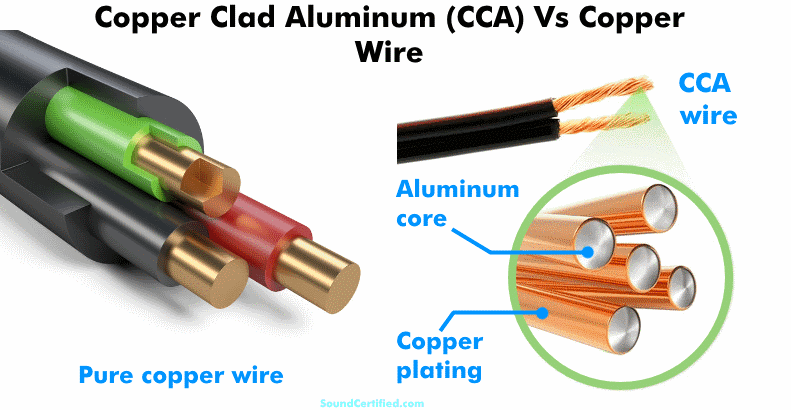
Copper clad aluminum (CCA) wire has, in the last few years, become more and more common as the price of copper wiring has gone up. It’s one of those “little things” you might not know when buying that companies aren’t telling you.
Unlike pure copper wire, copper-clad aluminum uses an aluminum wire core with a thin copper plating . From the outside, it misleadingly looks the same because of the plating.
Aluminum offers a lighter weight and lower cost than copper, so it’s at first glance it may seem like a great way to replace more expensive copper wiring. However, there’s an important difference that wire makers often won’t tell you!
How good is copper-covered aluminum speaker wire?
The good news is that CCA wire has the same sound quality as copper wire, meaning it’s fine for great sound. The problem is that aluminum isn’t as good of an electrical conductor as copper.
Aluminum has only 61% of the conductivity of copper (in other words, it has 39% more resistance) meaning it will take larger aluminum wires to get the same wire quality.
What to know before buying CCA speaker wire
In most cases like average listening &typical power levels, it’s not really a problem in day-to-day use. However, if you’re going to drive speakers at higher power levels or want the absolute best for your money, you’ll need to be sure to look for packaging that clearly states 100% pure copper.
Otherwise, copper-clad aluminum will work just as well if you follow this rule:when buying CCA speaker wire, to get the same quality as true copper cable go up one gauge in size.
For example, to replace 18 gauge copper speaker wire use a 16 gauge CCA wire.
Cases where speaker sound response, volume, or quality can be affected
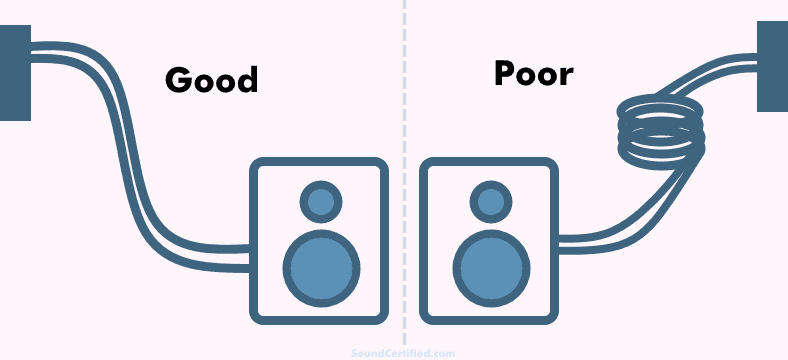
For best results, do not coil up excess lengths of speaker wire. Keep the free wire straight &curved instead. Coiled wire can act as an inductor and potentially affect the sound in some cases. (An inductor is a coil of wire that builds magnetic fields)
There are some cases where using wire the wrong way (or using the wrong kind type) leads to bad performance:
- Using non-standard wire or cable as speaker wire
- Winding long lengths of wire into a loop, creating a coil (creating an inductor basically)
- Breaks or cuts in speaker wire that cause problems with power flow
- Poor connections like twisting wire together instead of using a proper connection
- Heavily oxidized wire
- Loosely connected speaker box posts or terminals
To avoid nicking the wire inside, avoid using a razor or utility knife to strip wires. Use a stripper or other tool instead.
Exposed copper wire can oxidize badly over time and cause a very poor connection, especially after being exposed to moisture and especially other air outdoors. Be sure to check and cut &re-strip if necessary or use a nice clean connection or solder to eliminate this. Note that covering it with electrical tape isn’t enough.
Speaker wire terminals in speaker boxes can become loose and get hot once the connection is bad enough, causing a lot of power to be lost and give poor sound. It’s a great idea to check and tighten or replace terminals if you’re having sound quality issues.
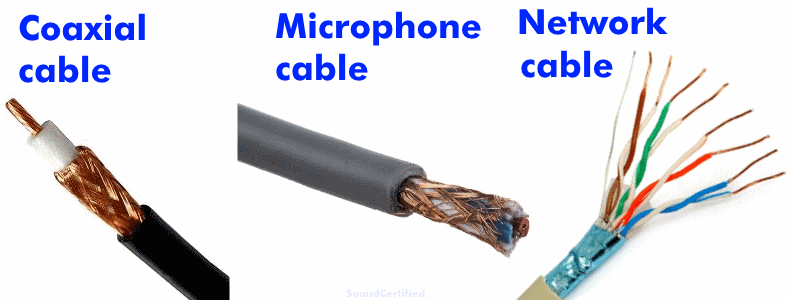
Even though you may be tempted to save money by reusing some extra wire or that instrument cable you’ve got lying around, cables are often bad choices for speaker wire. Coaxial cable, for example, can have higher capacitance and cause sound quality problems.
Microphone and network cables usually have much smaller conductors that can’t carry the power you need for speakers, as well as being more susceptible to break if they’re solid conductors.
More great speaker wire articles
I’ve got more helpful articles related to speaker wire, too:
- Learn how to fix speaker wire in your car!
- What size speaker wire you need including a speaker wire power chart
- Ran out of enough wire? Here’s how to extend &lengthen speaker wire the right way.
- Learn the basics of how to connect speaker wire.
- Here’s a helpful speaker wiring diagram guide for everyone.
- ·Altavoz Mitos Wire
- ·Instalación de sonido envolvente de cableado
- ·Hágalo usted mismo la instalación de sonido envolvente
- ·Cómo conectar los altavoces de sonido envolvente
- ·Cómo conectar Sherwood 6.1 Surround Sound
- ·INSTRUCCIONES PARA CONECTAR Surround Sound
- ·Cómo conectar Surround Sound para HD TV
- ·Cómo conectar un sonido envolvente 6.1
